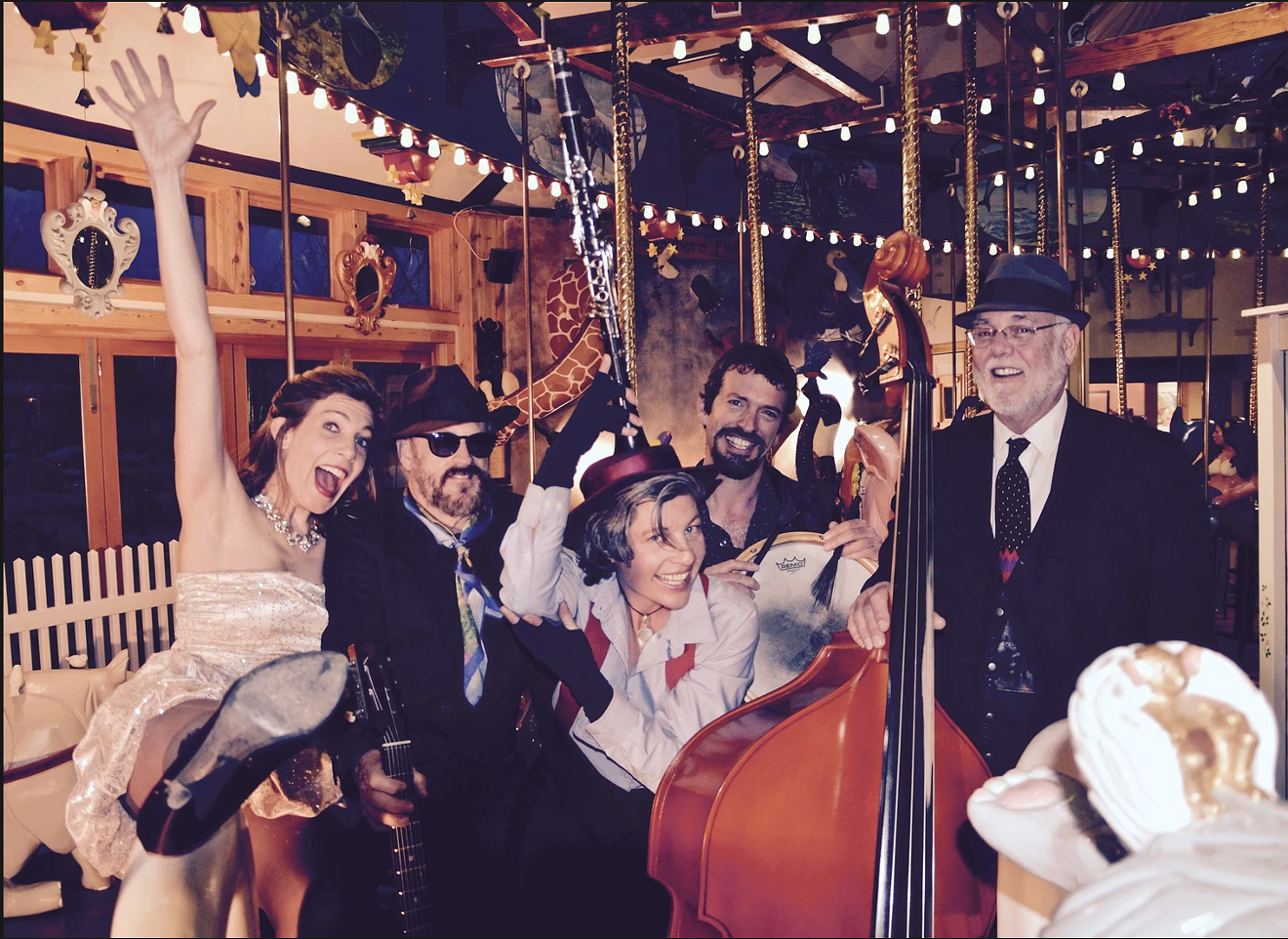Boulder songwriter David Williams, 67, has won an Emmy for his work on the PBS children's show The Big Green Rabbit, released six albums, and even wrote the book The Trickster Brain: Neuroscience, Evolution and Narrative in 2012, merging his studies in anthropology and English.
A year and a half ago, he formed the five-piece jazzy cabaret act Trickster Carousel. The band's name nods to his book, and the sound incorporates swing, Americana, blues and folk, but is driven by Django Reinhardt's gypsy jazz. Williams learned the genre from Kenneth “Jethro” Burns (of Homer and Jethro fame), first on mandolin and then guitar.
The outfit's members are singer Ashlynn Manning, whom Williams met at a gypsy-jazz jam at Carbon Cafe & Bar; his former bandmate Channing Lynn, a saxophonist, clarinetist and singer; his co-worker of two years, bassist Duane Webster; and drummer Stephen Van Balgooyen. The group honed its skills at a weekly residency at License One in the Hotel Boulderado.
Williams says he wanted Trickster Carousel songs to have both depth and naughtiness. On the quintet’s new album, Snake Oil, available for purchase on the band's website, iTunes and Apple Music, Williams explores ideas he wrote about in The Trickster Brain. Take the upbeat foot-tapping swing cut “Cradle to the Grave,” a humorous song about death and evolution that sounds like Tom Waits sitting in with the Squirrel Nut Zippers.
“Evolution never meant to make us happy,” Williams says. "Happiness is not something that evolution gives a shit about. It's just survival and getting your chance for the future. I took that and made a kind of a funny song, but it just so happened that right after I wrote that song, the whole COVID thing came out, so it was kind of apropos. It’s not so much making light of it, but just kind of poking fun at death, kind of sticking your finger at it, saying ‘Fuck you.’”
When penning the song, Williams says, he was thinking about the Middle Ages and children’s songs like “Ring Around the Rosie,” which is about the Great Plague, and how children make fun of situations that are deadly.
On the slinky ballad “Strip Girl,” the lyrics look at the life of a stripper, which includes the line “I’m really just another kind of clown.”
“The clown is a trickster figure,” Williams says. “What the clown does is play with us and brings out a lot of emotion and touches us in various ways, and just the whole thing about clowns is that they have so many connotations, both good and bad. They can be funny; they can be sad; they can be terrifying.
“There are tons of distortion of who we are,” Williams says. “In that distortion, it reveals something inside the strip girl. And the other thing in the lyrics, she's watching the crowd, and the crowd is watching her. She's a voyeur, as well, watching the people watching her, and it's a reflection; it's a mirror going back and forth.”
“The Carnival Song,” which feels like a Mule Variations-era Tom Waits ballad, closes out the album with a tale of a thirteen-year-old Williams seeing a strip show for the first time at a carnival.
“It was kind of a rite of passage, in a sense,” Williams says, “a kid seeing a naked woman dance on stage. But that's also got a trickster element to it, you know. It's going against the norms of society and pushing the buttons, pushing against puritanical values and opening things up to different interpretations of what's right or what is wrong and what's good and what's bad.”
Trickster Carousel was slated to play an album-release show at the Boulder Theater on January 28, but the show was rescheduled for Thursday, May 13.
[
{
"name": "Air - MediumRectangle - Inline Content - Mobile Display Size",
"component": "12017618",
"insertPoint": "2",
"requiredCountToDisplay": "2"
},{
"name": "Editor Picks",
"component": "17242653",
"insertPoint": "4",
"requiredCountToDisplay": "1"
},{
"name": "Inline Links",
"component": "18838239",
"insertPoint": "8th",
"startingPoint": 8,
"requiredCountToDisplay": "7",
"maxInsertions": 25
},{
"name": "Air - MediumRectangle - Combo - Inline Content",
"component": "17261320",
"insertPoint": "8th",
"startingPoint": 8,
"requiredCountToDisplay": "7",
"maxInsertions": 25
},{
"name": "Inline Links",
"component": "18838239",
"insertPoint": "8th",
"startingPoint": 12,
"requiredCountToDisplay": "11",
"maxInsertions": 25
},{
"name": "Air - Leaderboard Tower - Combo - Inline Content",
"component": "17261321",
"insertPoint": "8th",
"startingPoint": 12,
"requiredCountToDisplay": "11",
"maxInsertions": 25
}
]












